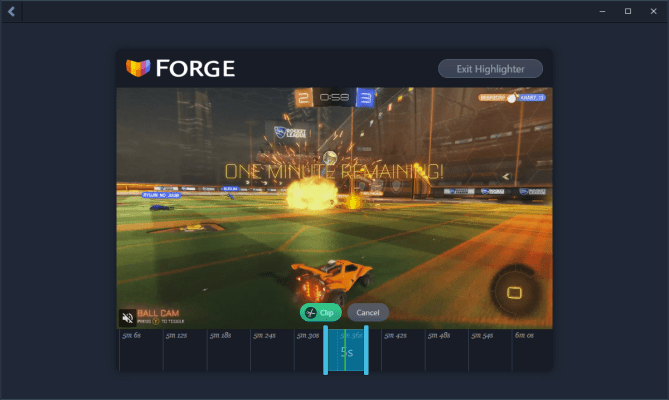Jared Kim might not be the best gamer — but he still wants to be able to share highlights from his sessions, and save them to remember them in the future. So much so that he decided to take a second crack at the premise with Forge, a new service entering beta today that helps gamers find short clips of the action and share them on different networks.
“With things like YouTube you have long form gaming content; on Twitch you have multi-hour streams — those are really cool, but we’re missing this entire segment of people like me,” Kim said. “I’m not a great gamer; there are some cool things I want to do that I want to save for myself.”
Forge has a large list of games that it supports, and Kim says it’s easy to add a new game. The service gives a light editing overlay over a game after a key is pressed, giving users the ability to grab a snippet of their game time that they can then share with their friends. The service is constantly recording the last 60 seconds of a play session — though, to be sure, that can still take up a lot of space. The service generally requires a 10GB cache to operate.
The majority of Forge’s clips are around 5 to 10 seconds, like a boss kill or a suave move in a game, that can be shared to other networks. Right now it’s just Twitter and Forge, but the company hopes to integrate with Facebook in the near future. There’s also ways to share content on the PlayStation 4 and Xbox One, but Forge is centered entirely around PC gaming.
You might remember something akin to this way back in the day — a tool called Fraps. But that tool often slowed down computers due to the requirements of recording. Forge works by sitting between the graphics card and operating system, and tries to offload as much of the computational requirements to a computer’s GPU as possible to keep performance high.
Most of the content shared through Forge (not unexpectedly) is centered around League of Legends, which could put it directly in the crosshairs of Twitch. But Twitch is largely centered around livestreaming and longer sessions, much like YouTube, which can make it difficult to sift through and find highlights, Kim said. There are other potential competitors like Plays.tv, but those startups are going after clips from competitions instead of highlights shared by regular gamers, he said.
Forge consists of nine people, largely from Kim’s last company WeGame, which was acquired in 2011. The premise isn’t too different from his last company: find an easy way to share moments in gaming with friends online, without them simply disappearing. That, inevitably, is Forge’s goal as well, Kim said. Everyone at Forge, naturally, is a gamer, too — and interestingly the team is strewn about the world instead of centered in a single place.
“That’s all lost — those moments are gone forever. With other parts of our life we have Facebook, Instagram. Everything we’re doing in gaming is being lost. Why is that? That shouldn’t be happening,” Kim said.
